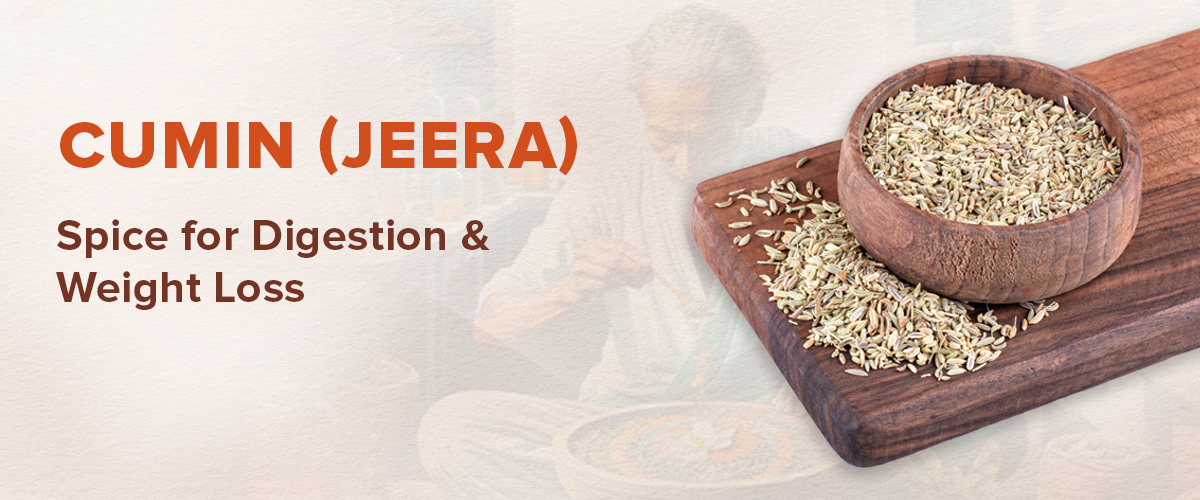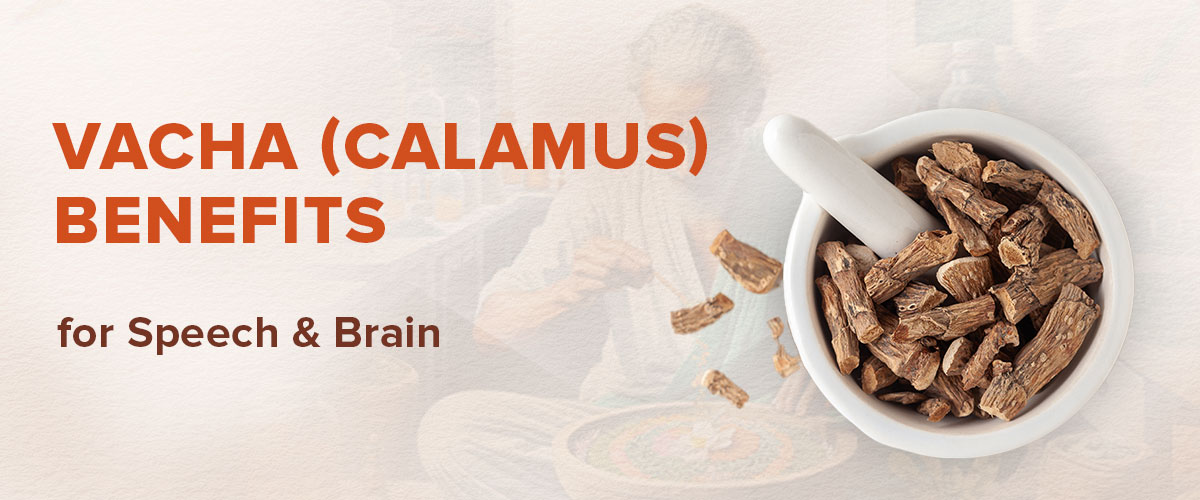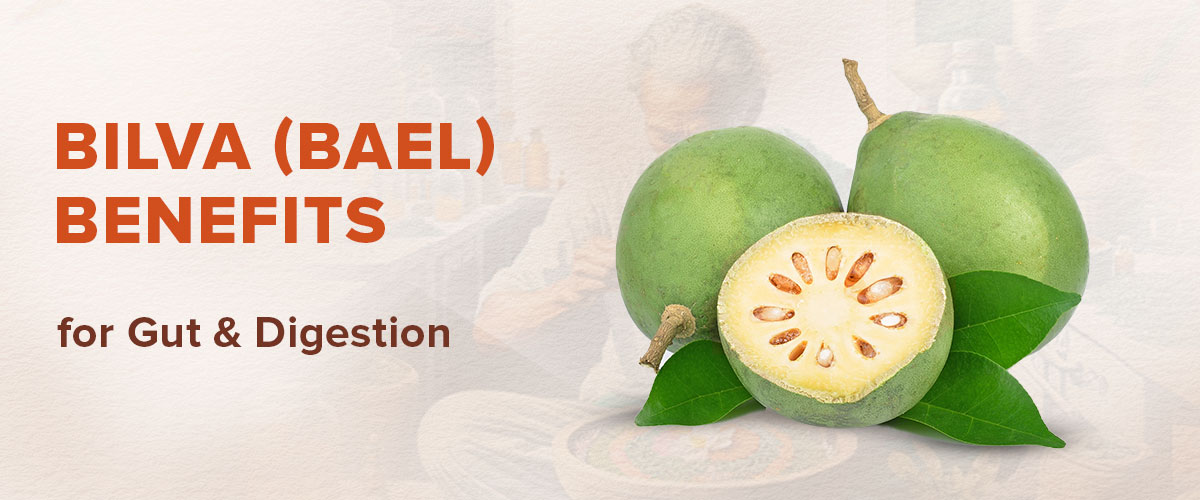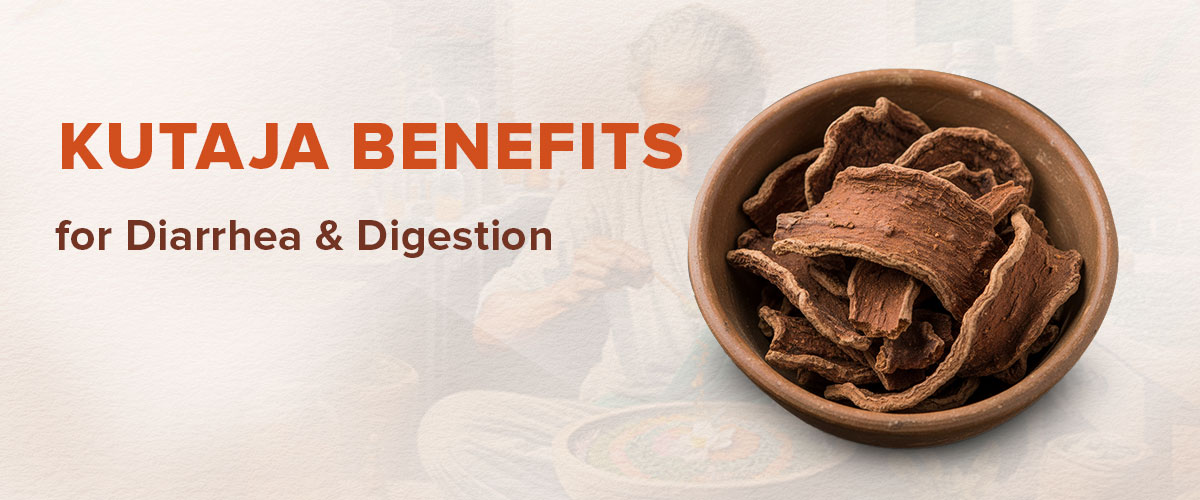Cumin: Benefits, Uses, and Healing Properties

Cumin is an annual herb from the Apiaceae or carrot family. In English, it is called Cuminum cyminum; in Hindi, it is called jeera; and in Sanskrit, it is called Jīraka (जीरक). In India, Persia, Egypt, and the Mediterranean, it's a common kitchen item that has been used for a long time as both a spice and a powerful Ayurvedic medicine.
Ancient texts praised its healing power, and modern science now backs many of those claims. One interesting study looked at 78 overweight adults who took cumin supplements three times a day for eight weeks. They lost an average of 1.1 kg and their BMI went down by 0.4 kg/m². This was much more than the 0.2 kg loss seen in the placebo group and the same as the drug orlistat in slowing weight gain. That's just one of the many benefits of cumin that scientists are looking into right now.
In this blog, you'll learn how to use these cumin benefits every day, how to include cumin in your cooking and health routine, and some important safety tips to keep in mind.
What is Cumin & Its Ayurvedic Properties?
Cumin, or Jeera, has been used for hundreds of years as an Ayurvedic remedy to help with digestion and overall health. Jeeraka has been used in traditional medicine to help with digestion, gas, and menstrual pain. Let's understand this in simple terms so you can see why cumin is such a strong herb.
- Taste (Rasa): Cumin tastes strong (Katu) and a little bitter (Tikta). This rejuvenates your digestive system and makes you hungry. Cumin can really help if you often feel bloated, heavy, or tired after eating.
- Qualities (Guna): Cumin is light (Laghu) and dry (Ruksha) in its natural state. That means it doesn't make your system feel heavy, and it can even help make your gut feel less heavy or sticky. These traits are especially helpful if you often feel bloated or gassy.
- Virya (potency): It has the power to heat (Ushna). This warmth helps get your Agni (digestive fire) going, which is necessary for breaking down food correctly.
- The Effect After Digestion (Vipaka): Cumin has a strong (Katu) effect after it is digested. This helps keep your system dry and light, supports detox, and prevents the buildup of toxins (Ama).
Cumin Benefits for Your Health
Cumin is one of those rare herbs that works on multiple levels, from your digestion, immunity, metabolism to your skin. Let's look at the most important benefits of cumin, using both Ayurvedic knowledge and what modern science says.
Helps with Digestion and Reduces Gas
Ayurvedic View: Cumin is called Deepan (appetiser) and Pachan (digestive) in Ayurveda. It makes Agni (digestive fire) stronger, which helps your body break down food better. It also helps Vata, which is often what causes gas and bloating.
Modern View: Cumin makes digestive enzymes work better. It helps your body take in nutrients and lessens common problems like gas, acidity, and upset stomach. Many people drink jeera water in the morning to keep their stomachs light and active.
Helps you Lose Weight
Ayurvedic View: Cumin helps the body get rid of extra fat (Meda dhatu) and speeds up metabolism naturally by warming and cooling it. It also gets rid of Ama (toxins), which is something that Ayurveda says can make you gain weight without you knowing it.
Modern View: Research shows that cumin can help you lose weight and get rid of belly fat. It works by speeding up your metabolism and lowering the amount of bad lipids in your blood.
Boosts Immunity and Fights Infections
Ayurvedic View: Cumin boosts Ojas, which is the energy that keeps your body healthy. It also cleans your body from the root by acting as a natural detoxifier.
Modern View: Cumin is very good at killing bacteria, fungi, and inflammation. It helps your body fight off common infections like colds, coughs, and even fungal infections.
Helps with Menstrual Pain
Ayurvedic View: According to Ayurveda, menstrual cramps are often caused by an imbalance in Vata. Cumin helps relax Vata and eases pain and bloating. It also helps replace iron that is lost during periods.
Modern View: Cumin seeds have a lot of magnesium and iron in them. These vitamins and minerals can help with cramps and give you more energy during your period.
Good for Skin care
Ayurvedic View: Cumin's anti-inflammatory and detoxifying properties help get rid of excess heat and toxins in the blood, which are two common causes of skin problems in Ayurveda.
Modern View: Cumin can kill bacteria that cause acne on your skin. Using cumin water or paste can help calm down irritation and make your skin clearer.
Cumin for Specific Health Conditions
Besides helping with digestion and immunity, cumin can also help with a number of common health problems you might have.
Help with Diarrhoea
Ayurveda says that diarrhoea is caused by weak digestion and too much Vata. Cumin helps by boosting your digestive fire (Agni) and soaking up extra fluid in your intestines. Tannins and flavonoids in cumin can help stop loose motions from happening too often.
Cramps and Stomach Pain
Cumin helps balance Vata, which is often the cause of sudden stomach pain or cramps. It also helps get rid of stuck gas. Cumin is known for its ability to calm the stomach and ease mild pain.
Low Iron or Anaemia
Cumin is known to help Rakta dhatu (blood tissues) and boost energy levels, especially in women who lose iron during their periods. If you don't get enough iron, often feel tired, or are prone to anaemia, this is a simple but effective choice.
Poor Circulation or Sensitivity to Cold
Cumin is great for people who get cold easily or have poor blood flow because it warms them up. It warms you up from the inside, improves your blood flow, and keeps your energy up.
High Cholesterol
Cumin can help if you're worried about your cholesterol. It has been shown to lower triglycerides and bad cholesterol (LDL) while raising good cholesterol (HDL). You can use this spice every day because it is good for your heart.
Irregular periods
If you often have painful or irregular periods, cumin can help you feel better. It balances Vata, eases cramps, and gives you iron to make up for the blood you lose during your period.
Weak Immunity
Cumin could be a simple daily boost for you if you get sick a lot. Cumin helps your body heal faster and strengthens its natural defense system because it fights bacteria and inflammation.
Who Should Use Cumin?
Cumin is one of those rare herbs that’s helpful for almost everyone. Let’s look at how Cumin benefits women, kids, and older adults in different ways.
Cumin for Women
Cumin can help women who have irregular periods, cramps, or low energy during their cycle. It has a lot of iron in it, which helps make up for the blood loss that happens during menstruation. It also helps with Vata imbalance, which can make you feel bloated, hurt, and have mood swings during your period.
Cumin for Kids
Yes, it's safe for kids to use cumin in small amounts. A mild cumin water preparation can help if your child often has gas, indigestion or loose stools. It helps their digestion and keeps their stomach calm.
Cumin for Seniors and Older Adults
As you get older, your digestion slows down, which can lead to problems like bloating, not wanting to eat, or constipation. Cumin helps by gently waking up your digestive system and making it easier for your body to absorb nutrients.
Can Cumin Be Taken with Other Medicines?
Cumin is a natural substance, but that doesn't mean it's always safe, especially if you're already taking other medicines. Cumin is safe for most people when they eat it in normal amounts, but there are a few things you should be careful about if you're using it for health reasons.
Be careful if you take blood thinners. Taking a lot of cumin or taking it for a long time may slightly raise the risk of bleeding. If you take medications like aspirin or warfarin, you should talk to a Jiva doctor before adding cumin supplements or strong preparations to your routine.
Is Cumin Safe? Who Should Avoid It?
Cumin is generally safe when used in food or as a home remedy but like any herb, it may not suit everyone in every situation.
Common Side Effects of Cumin
- Some people may have mild problems like heartburn or acidity, especially when they eat a lot of it.
- If you put it on your skin in a concentrated form, it can cause rashes.
- Low blood sugar, which can be dangerous if you already take diabetes medicine.
- Taking this with blood-thinning drugs raises the risk of bleeding.
These side effects are not common and usually only happen if you take too much or use strong drugs for a long time.
If you notice anything unusual, like stomach discomfort, skin irritation, or sudden fatigue, stop using cumin immediately.
Always talk to a Jiva certified expert to be completely safe, especially if you already have health problems or take medicine regularly.
Cumin vs Other Ayurvedic Herbs
Cumin shares many benefits with other Ayurvedic herbs, especially those that support digestion, metabolism, and detox. Let’s look at how cumin compares with two commonly used herbs: Ajwain (Carom seeds) and Fennel (Saunf).
Cumin vs Ajwain (Carom Seeds)
|
Feature |
Cumin (Jeera) |
Ajwain (Carom) |
|
Best Use |
Improves digestion, eases bloating, balances Vata |
Relieves gas, colic pain, combats parasites |
|
Nature (Guna) |
Light & dry |
Light, dry & sharp |
|
Potency (Virya) |
Heating |
Strongly heating |
|
Effect on Doshas |
Balances Vata and Kapha |
Balances Vata and Kapha, may increase Pitta |
|
Mind/Body Effect |
Calms digestion, mildly stimulating |
Strong digestive stimulant, may feel intense |
Cumin vs Fennel (Saunf)
|
Feature |
Cumin (Jeera) |
Fennel (Saunf) |
|
Best Use |
Boosts digestion, relieves flatulence |
Soothes digestion, freshens breath |
|
Nature (Guna) |
Light & dry |
Light & oily |
|
Potency (Virya) |
Heating |
Cooling |
|
Effect on Doshas |
Balances Vata and Kapha |
Balances Pitta and Vata |
|
Mind/Body Effect |
Slightly energising, improves appetite |
Calming, relaxes the gut and mind |
Ready to Bring Cumin Into Your Routine?
Cumin is a powerful Ayurvedic herb that can help with digestion, immunity, energy, skin health, and more. Cumin is a simple and effective way to help with everyday gas, irregular periods or just to feel lighter and healthier.
But remember this: even natural herbs like cumin work best when you use them in the right way and in the right amount. What works for one person might not work for another because everyone's body is different.
That's why it's important to get help from a Jiva certified expert. For personalised advice on any health concern you may be facing, call our Jiva experts today at 0129-4264323.
FAQs
What are the healing properties of cumin?
Cumin is good for your digestion, reduces inflammation, and fights free radicals. It can help you lose weight and ease menstrual cramps, as well as improve your gut health and support your immune system.
When is the best time to eat cumin?
The best time to take cumin depends on what you want to do. Take it after meals if you want to help your digestion or get rid of bloating. If you're drinking jeera water, the best time to do it is early in the morning on an empty stomach.
What organ is cumin good for?
Cumin is great for your stomach and digestive system in particular. It helps with digestion, cuts down on gas, and helps the body absorb nutrients. It also helps your liver by getting rid of toxins and making bile flow better.
What shouldn't you take with cumin?
Be careful if you take diabetes or blood thinners. Cumin might increase bleeding risk or lower your blood sugar more than you thought. Before mixing cumin with prescription drugs, you should always talk to a Jiva doctor.
Is cumin good for sleeping?
Yes. Cumin has small amounts of melatonin and other calming chemicals that may help you relax and get better sleep. If you have mild insomnia, drinking warm jeera water at night or adding cumin to your dinner might help.
Does cumin help lower cholesterol?
Yes. Studies show that cumin can lower triglycerides and bad cholesterol (LDL) levels while raising good cholesterol (HDL) levels. Adding cumin to your meals or drinking jeera water regularly can help keep your cholesterol levels healthy if you're worried about your heart health.
Is it safe for kids to eat cumin?
Yes, kids can safely eat cumin in small amounts, like in food or mild cumin water. It can help with gas, upset stomach, and even mild diarrhea. But if your child has stomach problems or any other health problems, you should talk to an Ayurvedic expert before giving it to them every day.



 Prev
Prev





























